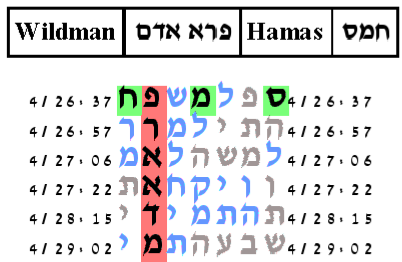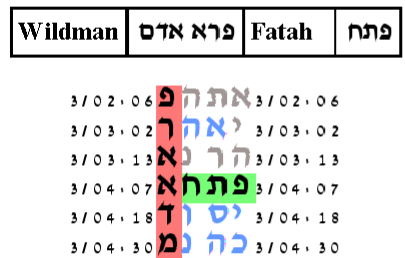http://torahcode.us/torah_codes/ishmael/ishmael1.shtml
The Biblical Conflict: Ishmael and IsraelIshmael, whose name means G-d will hear, is the patriarch of that part of the semitic people who today are known as Arabs. In Pirke de Rabbi Eliezer we read,
Why was his name called Ishmael? Because in the future, the Holy One blessed be He, will hearken to the cry of the people arising from the oppression which the children of Ishmael will bring in the land the last [of] (days). (Pirke de Rabbi Eliezer, M. Friedlander, trans., Varda Books, Skokie, 2004, p. 266)
To the cry of the people means to the cry of the people Israel. In the land, means in the land of Israel. The oppression referred to means the last stage of the conflict between Israel and Ishmael, the stage that is to occur in the times just before time of the Messiah.
The conflict between Israel and Ishmael begins in biblical times when the patriarch Abraham sends away his concubine Hagar with her child Ishmael.
Why does he send them away? Because Sarah has paid attention to what Ishmael is doing with Isaac. She sees that he מצחק, taunts or mocks, Isaac (Genesis 21:9). On the one hand, as explained by Rabbi Hirsch, Ishmael makes fun of the religious teachings that Abraham is teaching his son Isaac.
He [Ishamel] took in just as much of the great ideas of Abraham to make him ironically disdain them, and over that which the world in general greeted merely with laughter in which derision was only lightly mixed. The Pentateuch Genesis, Samson Raphael Hirsch, Isaac Levy trans., Judaica Press, Ltd, Gatehead 1989, p. 354.
On the other hand, the term מצחק is used in several other ways in scripture: idolotry (Exodus 32:6); fooling around, jesting (Genesis 19:6); sexual play between man and wife (Genesis 26:8); adultery (Genesis 39:17); and murder [where the צ is exchanged for a ש] (II Samuel 2:14).
Midrash Rabbah provides more details. With regard to sexual play,
Sarah saw Ishmael ravish maids, seduce married women and dishonour them. (Midrash Rabbah, Genesis I, H. Freedman, trans., The Soncino Press, London, 1983, p. 470.)
With regard to idolotry,
Sarah saw Ishmael build alters, catch locusts and sacrifice them. (ibid. p. 470.)
With regard to murder,
R. Azariah said in R. Levis name: Ishmael said to Isaac,
Let us go and see our portions in the field.
Then Ishmael would take a bow and arrows and shoot them in Isaac's direction, whilst pretending to be playing. (ibid. p. 470.)
From this we conclude that Ishmael not only made fun of Abraham, his father's teachings, but that he as well attempted sexual play with unmarried and married women, that he engaged in practices of idolotry, and that he attempted to murder Isaac by what would seem like a chance accident with bow and arrow.
Thus Sarah tells Abraham to send Hagar and Ishmael away. Sending Ishmael away means disinheriting Ishmael. And G-d tells Abraham to listen to Sarah. (Genesis 21:12.)
Ishmael: A Wild ManThe Torah tells us just before the time that Ishmael is conceived that Hagar's son Ishmael would be a פרא אדם, pere adam, a phrase whose syntax literally means a wild one in the form of a man, although it is typically translated simply as wild man. (Genesis 16:12.)
The Ramban interprets פרא אדם in the following way:
The correct interpretation is that פרא אדם is a construct form meaning that he will be a wild-donkey man accustomed to the wilderness going forth to his work, seeking for food, devouring all and being devoured by all. (Ramban: Commentary on the Torah, Vol 1, Genesis, Charles Chavel trans., Shilo Publishing House, New York, 1971, p 214.)
Rabbi Hirsch says that a wildman cannot bear constraint. He who has no constraint, will be contrary to and in everyone's face. We add that constraint here can also be understood as the constraint of reason. Rabbi Hirsch writes
He will quietly take up and maintain his [unreasonable] position in spite of all his brothers. Nobody will be his friend and still nobody will dare to oppose him. (Samson Raphael Hirsch, The Pentateuch, Genesis, Translation and Commentary, Isaac Levy trans., Judaica Press, Ltd, Gatehead 1989, p. 288)
The principal character trait of a wildman is passion and lust. To whatever the wildman does, there is a hot-headed emotional passion and lust. It is natural therefore to check the key word Wildman with the key word Lust and the key word Ishmael with the key word Lust. The first pairing is not statistically significant. For the second pairing we obtain a statistically significant result. With the expected number of ELSs set to 40, the probability that a text from the ELS random placement text population would produce a table as small as that produced by the Torah text is 81.5/10,000.

